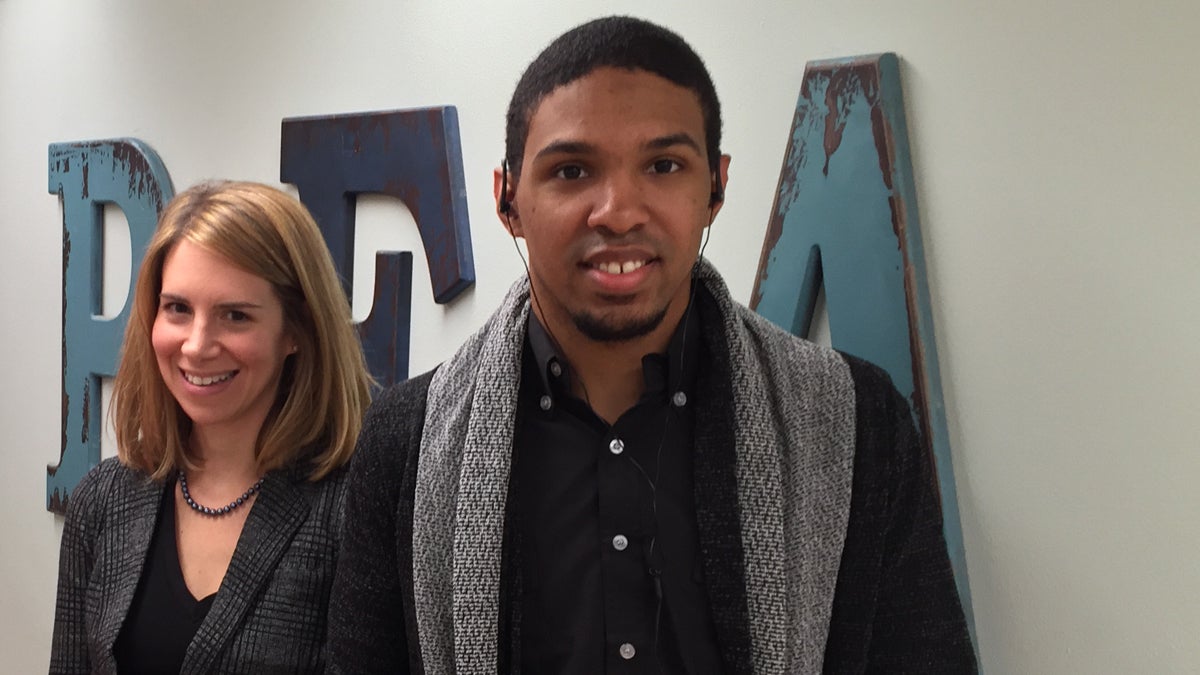Keeping lives on track through early psychosis intervention
Listen
Irene Hurford and Oberon Wackwitz in front of a wall that reads "PEACE". PEACE stands for Psychosis Education
Oberon Wackwitz has a boyish face and easy smile, he’s a sharp dresser. He’s 20 years old, and in college. With his friendly, open demeanor, it’s hard to imagine that just over a year ago, Oberon was withdrawn and alone, contemplating ending his life.
“I was kind of hearing these voices that were coming from my head, and I knew they were coming from my head, they were very loud,” he recalled.
A mind, slipping away
This started happening during Oberon’s first year in college. He was terrified. Ashamed. He was responding to the voices – but was hiding that as much as possible.
“My brother would walk in and say ‘what are you doing?’ and I’d say ‘I’m rehearsing for something,’ or ‘nothing,’ or ‘I’m speaking out loud, or thinking out loud.'”
He was experiencing psychosis, which, in its early stages, can appear as more of a blurring between what’s real and what’s imagined.
As time went on, the voices in Oberon Wackwitz’s head grew louder and more demanding. They told him to cut himself. That he was worth nothing. Eventually, things got so bad, he checked himself into a psychiatric hospital. It was not the caring environment he had expected.
“It felt like being in a prison, they take your phone, they take your belongings, you have to wear hospital clothes,” he said.
He was also frightened by the other patients there. They were mostly older, years into serious mental illnesses, talking to themselves, shuffling along. He thought this was going to be his future.
When he met a patient his age, a girl, he was excited, but that didn’t last long.
“She’s like ‘the people here are kind of crazy right,’ and I said ‘yeah’ and we were just talking, and then she says ‘you know, my sister is in the Illuminati, and then these bats flew out of her,’ and I was like, ‘okay…'”
He says the week-long hospital stay did help him, because he might have died by suicide without it – but overall, it was a terrible, scary experience.
And this is how many people with psychosis are introduced to the mental health field.
“Then when he is discharged, and says ‘I’m never going back there’ – then we talk about him being non-compliant as though it’s his fault,” said Irene Hurford who runs a Philadelphia early intervention program called PEACE. PEACE stands for Psychosis Education, Assessment, Care, and Empowerment.
It’s a two year intensive outpatient program where Oberon is now receiving care. Talk therapy, music and art groups, family therapy – and medications – everything under one roof. He’s doing well and handling his responsibilities as a college student.
Replicating success stories for people with psychosis
Mental health providers around the country are trying to achieve this kind of success story – to get people help before their lives are derailed.
Psychosis is associated with some of the most serious mental illnesses. Schizophrenia. Bipolar disorder. It affects only a small portion of the population – but Hurford says the impact is severe.
“Psychosis is bad for the brain, and the longer you have it, the worse things are for you in the long run.”
Hospitalizations, no education or employment, and homelessness are some of the typical outcomes.
About four million young Americans suffer from a severe mental illness. Research finds that less than half of them receive the necessary treatment.
The PEACE program serves Medicaid recipients. People are referred by hospitals, sometimes by family members, social workers – and the main goal is to keep young people on track after an experience that shook them to the core.
“Our expectation of people in our program is that they go back to their communities and live their lives,” said Hurford. “So it is truly an expectation and not a goal that people go to school or go to work, because they are young people at the very beginning of their lives, and it is not okay to drop out.”
Early intervention around the country
PEACE is still fairly new, just over a year old, but it’s modeled on older early intervention programs in the U.S. A program in Maine tries to catch people during the earliest phase of psychosis – before they are even ever hospitalized. “We’ve been able to show substantial preventive effects – if you get there early enough not only might you prevent the episode, but you preserve a lot of the natural functional abilities that these young people have,” said William McFarland of Tufts University School of Medicine. He’s helping to replicate programs like this at 15 sites nationally.
“Think about what happens when you get the flu, you get very sick, but in the beginning you feel tired and you have a sore throat – so it’s similar to that. In the early phases, people with psychosis are still going to school, still working, but they start to notice interferences with their thinking, memory, and functioning.”
Oregon started to run early interventions in 2001. Tamara Sales of Portland State University oversees the now statewide network which has drastically reduced hospitalizations for clients – and kept them in school and employed. “And the majority of people are choosing not to go on disability,” added Sales.
This is a big deal. Remember – we’re talking about people in their late teens, early 20s – a time when you decide what you’ll be as an adult.
“To go on disability at that point can be a major long-term determinant of what their life course is.” Sales says most people who get on disability don’t come back off.
Research on programs like this – here and abroad – had found similar results. Less illness – better outcomes.
The World Health Organization declared that the duration of untreated psychosis should be three months or less, says Irene Hurford again. “Our duration in the U.S. is one to three years, so we’re really far off the mark.”
She spends a lot of her time educating people about the early warning signs of psychosis – and trying to diminish the massive stigma that surrounds psychosis.
Oberon Wackwitz says getting enrolled with the PEACE program has given him a lot of courage to talk about his condition. He’s invited family members and friends to attend group sessions at PEACE to learn more.
He says without the program, he might not be here. He might have heeded the voices that told him to end it all.
WHYY is your source for fact-based, in-depth journalism and information. As a nonprofit organization, we rely on financial support from readers like you. Please give today.




